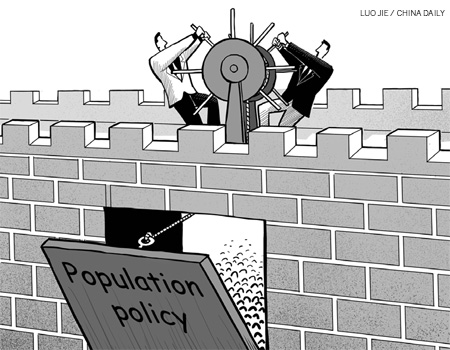View
Debate: Family planning
Updated: 2011-03-21 08:02
(China Daily)
Li Xiaoping
Family planning policy fine as it is
At the annual sessions of the National People's Congress (NPC) and the Chinese People's Political Consultative Conference (CPPCC) National Committee, many NPC deputies and CPPCC members again suggested that the family planning policy be relaxed further.
In most regions, if husband and wife both are the only children of their parents, they can have a second child. But some NPC deputies and CPPCC members suggest if either of the couple is the only child of his or her parents, it should be given the option to have a second child.
The suggestion is not worthy of consideration. The world's most populous country has just overcome the specter of famine, which for decades had been threatening our food security. To provide food for the entire population, we have already used a lot of energy and resources, and even sacrificed the environment. Given the present situation, the severe scarcity of water should be enough to stop people from thinking of having bigger families.
Even under existing conditions, the country's population is increasing by about 7 to 8 million a year. Our duty should be to deal seriously with the prevailing social, economic and environmental problems, instead of aggravating them.
Before suggesting a change in the family planning policy, the NPC deputies and CPPCC members should have considered the following facts. China's 1.35 billion people and 900 million labor force are more than the total of all the developed countries put together. China's territory is less than 20 percent of the combined area of Russia, Canada, the United States, Brazil and Australia but its population is nearly double that of the five put together. China is among the 13 countries that suffer from severe water scarcity, its per capita water availability is one-fourth of the world average and more than 400 of its cities are battling acute water shortage. China's national GDP is more than Japan's but its per capita GDP is less than 10 percent of its eastern neighbor. And to match the per capita GDP of the US, China's national GDP should be $63 trillion, or the GDP of the entire world. Besides, some US scholars say that if all human beings were to live like people in the US, we would need eight more planets like Earth.
For centuries, people in China's vast countryside have had families larger than their urban counterparts. Even today, many rural couples still have more than one child, because it is considered important for agriculture and for taking care of the elderly.
But since we have entered the industrial age, our economic development model has to keep pace with the times. This is to say that social institutions should be set up to take care of senior citizens. So the critical question today is how best to take care of the country's aging population.
Socialized old-age care can be divided into two parts. One, the government provides pensions, raised by society and paid for by people during their working years. And two, the government offers special care and nursing services through institutions to senior citizens who cannot take care of themselves. Years ago, I suggested a dual old-age care model based on the differences between China's rural and urban areas. In the countryside, the government should provide basic living allowances to senior citizens who can take care of themselves, and housing for those who cannot in local nursing homes for the aged. In cities, the government should pay basic living allowances to the elderly who do not receive a pension, and build more nursing homes in the suburbs.
Apart from the problems mentioned above, the problem of providing for the elderly also has to be solved. And it will take a lot of efforts, funds, resources and time to do that. In other words, there is no room for further relaxation in the family planning policy.
Moreover, if the policy is adjusted, it could worsen the already disproportionate sex ratio. Suppose the policy is relaxed, the present boy-to-girl ratio of 120:100 could rise to 127:100 because of Chinese parents' traditional preference for boys. This would aggravate social problems.
People who want the family planning policy changed on human rights grounds must realize that every country sets its population policy according to its specific national conditions. Without following the strict family planning policy for the past three decades, China would not have been able to make such rapid progress.
China still has a long way to go before becoming an advanced country, and it will not unless it solves all existing problems. So instead of trying to expand the country's population, we should try to bring it down to 500 million.
The author is a research scholar with the Institute of Population and Labor Economics, Chinese Academy of Social Sciences.

Specials

'Super moon'
The "Super Moon" arrives at its closest point to the Earth in 2011.

Radiation test
The probability of being exposed to a life-threatening level of radiation is quite slim.

Earthquake Hits Japan
A massive 8.8 magnitude quake hit the northeast coast of Japan on March 11,2011.